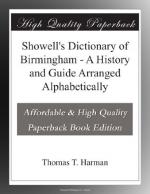Coining.—Booth, the noted coiner and forger, was captured at Perry Barr, March 28, 1812, his house being surrounded by constables and soldiers. In addition to a number of forged notes and L600 in counterfeit silver, the captors found 200 guineas in gold and nearly L3,000 in good notes, but they did not save Booth Irom being hanged. Booth had many hidingplaces for his peculiar productions, parcels of spurious coins having several times been found in hedgerow banks and elsewhere; the latest find (in April, 1884) consisted of engraved copper-plates for Bank of England L1 and L2 notes.—There have been hundreds of coiners punished since his day. The latest trick is getting really good dies for sovereigns, for which Ingram Belborough, an old man of three score and six, got seven years’ penal servitude, Nov, 15 1883.
Deserters.—On 24 July, 1742, a soldier deserted from his regiment in this town. Followed, and resisting, he was shot at Tettenhall Wood.—A sergeant of the Coldstream Guards was shot here while trying to capture a deserter, September 13, 1796.
Dynamite making.—One of the most serious offences committed in Birmingham was discovered when Alfred Whitehead was arrested April 5, 1883, on the charge of manufacturing nitroglycerine, or dynamite, at 128, Ledsam Street. Whitehead was one of the Irish-American or American-Irish party of the Land Leaguers or Home Rulers, who entertain the idea that by committing horrible outrages in England. they will succeed in making Ireland “free from the galling yoke of Saxon tyranny” and every Irishman independent of everybody and everything everywhere. Well supplied with funds from New York, Whitehead quietly arranged his little manufactory, buying glycerine from one firm and nitric and sulphuric acids from others, certain members of the conspiracy coming from London to take away the stuff when it was completely mixed. The deliveries of the peculiar ingredients attracted the attention of Mr. Gilbert Pritchard, whose chemical knowledge led him to guess what they were required for; he informed his friend, Sergeant Price, of his suspicions; Price and his superior officers made nightly visits to Ledsam Street, getting into the premises, and taking samples for examination; and on the morning named Whitehead’s game was over, though not before he had been watched in sending off two lots of the dangerously explosive stuff to London. There was, however, no less than 200lbs weight found still on the premises. The men who carried it to London were quickly caught with the dynamite in their possession, and with Whitehead were brought to trial and each of them sentenced to penal servitude for life. The distribution of rewards in connection with the “dynamite outrages,” so far as Birmingham people were concerned, was somewhat on a similar scale to that described by the old sailor, when he said “prize-money” was distributed through a ladder, all passing through going to the




